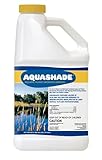Best Heron Deterrents for Your Pond (Effective Repellent & Control)
Pond Academy is reader-supported. Buying through links on our site may earn us an affiliate commission. As an Amazon Associate I earn from qualifying purchases.
A fish pond takes time, money, and effort to set up and maintain.
So, the last thing you want is a heron eating your prized fish right out of your pond!
Luckily, there are various ways to deter these predators and keep your fish safe.
Let's look at the best heron deterrent for ponds and answer a few frequently asked questions from pond owners regarding herons.
Pond Netting
Placing a net or cover over your pond is a simple and effective way to protect your fish from all types of heron (blue heron, grey heron, etc.). Using a fishing line to deter herons (simply stretching it across your pond in a net-like pattern) is another similar DIY heron deterrent.
This method makes it more difficult for a bird to wade into your pond and snag fish out of it. Just remember to use heavy-duty pond netting and securely fasten it around the entire perimeter of the pond.
While protecting your pond with netting is an effective way to keep predators out, it can be unsightly and, in the opinion of many pond owners, can take away from the beauty of your pond or water garden.
Pros
- Effectively deters herons and other predators like cats, raccoons, etc.
- Not only protects pond fish from predators but stops outside debris like leaves, etc.
- 24/7 protection for your pond.
Cons
- Some people find netting to be unsightly and ruin the aesthetics of your pond.
Get Our Best Pond Tips Sent to Your Inbox for Free!
Join thousands of others and learn from our decades of pond building and maintenance experience! Your pond will thank you!
By subscribing you agree to receive emails from PondAcademy.com. We will always respect your privacy and you can unsubscribe at any time.
Automatic Heron Sprinkler
Herons are skittish birds, therefore scare away easily when spooked. And a motion-activated sprinkler is a safe and effective way to spook these predators when they come near your pond or water garden.
Motion-activated sprinklers, like the one I recommend here or the popular ScareCrow Heron Deterrent spray, are a humane way to repel predators and pests from your pond. They simply detect a predator nearing your pond through motion and spray them with water to effectively scare them off.
This method can work for multiple types of predators and works around the clock, even when you're sleeping.
Pros
- Effectively deters herons and other predators like cats, raccoons, etc.
- 24/7 protection for ponds.
- Safe and humane solution.
Cons
- The water blast might not be enough to ward off some herons.
- You need to have a hose and water outlet near your pond.
Blue Heron Decoy
If you want to attract ducks to your pond, one method is to place duck decoys in your pond as they feel safe in numbers.
Herons operate a little differently. In fact, placing a blue heron decoy in your pond has proven to be a great way to repel herons (not attract them)!
Herons are territorial birds and prefer to feed alone, so if they think other herons are already feeding at your pond, they will be more likely to avoid the area and continue flying by.
While this is a humane way to deter herons, it doesn't always work. If certain herons frequent your area and continually notice your decoys in your pond, they may, over time, feel like the decoys aren't a threat. There's not much you can do about this except try moving your heron decoys around to trick them into thinking they are real.
Blue heron decoys are cheap, so they are worth trying out. And we always recommend using them in combination with other methods mentioned here.
Pros
- Effective blue heron deterrent.
- 24/7 protection for ponds.
- Safe and humane way to deter herons.
Cons
- Can lose their effectiveness.
- Won't stop all herons from visiting your pond.
Alligator Decoy
Alligator decoys are not only fun pond decorations, but they are also a means of effective predator control, including herons.
This alligator decoy provides a real-life look that even appears to be moving with wind and water movement. And since herons are the natural prey of alligators, these decoys are a pretty effective heron repellent.
However, if you live in an environment without alligators, then the heron will likely not be afraid of the decoy.
Pros
- Effectively deters herons and other predators like cats, raccoons, etc.
- 24/7 protection for ponds.
- Safe and humane way to deter herons.
- Easy to install.
Cons
- Might not work in environments where alligators are not native
Bird Scare Tape
Bird scare tape is an effective repellent for all kinds of birds, including geese, ducks, pigeons, and, of course, herons!
This type of tape combines an iridescent material with a flashy, shimmering surface and a crinkling sound that effectively scares off many species of birds, including grey and blue heron.
And not only is it a humane and safe bird repeller, but it's also incredibly easy to install (just cut into strips and hang around your pond), is eco-friendly, and is non-toxic.
Pros
- Effectively deters herons and birds like geese, ducks, and pigeons.
- 24/7 protection for ponds.
- Safe and humane solution.
- Eco-friendly.
- Easy to install.
Cons
- Hanging flashy strips around your pond can make it lose some of its visual appeal.
Make Fish Less Visible
An effective way to stop herons from visiting your koi pond is to make its inhabitants less visible. This can be done by using pond dye, setting up a waterfall or fountain, and adding floating plants to your pond or water garden.
Pond dye, for example, is used to enhance the look of your pond. But, it can also be used to hide your fish, as herons passing over won't be able to see your fish swimming through the dye (as long as they aren't near the water's surface).
Waterfalls and fountains provide a consistent source of water agitation. This rippling water will help deter herons and make it harder for them to see fish below the surface.
Pond plants, especially the floating types, provide valuable hiding spots for your fish. As a bonus, they can help oxygenate your water and clean it by filtering out pollutants.
Fish Shelter
Preventing all herons from visiting your pond may not be possible, so it's a good idea to give the koi, goldfish, or other pond fish a chance to protect themselves.
If they don't have any hiding spots under ledges in your pond, then add an aluminum and mesh fish shelter!
This 18 x 12-inch long shelter provides a safe barrier from predators, including blue herons. They also provide shade for your fish on sunny days.
Pros
- 24/7 fish protection.
- Safe and humane protection for koi and other fish.
- Eco-friendly.
- Provides shade.
Cons
- It does not deter predators, but rather it provides protection when a threat does come along.
- You may need a lot of shelters if you have a lot of fish




















